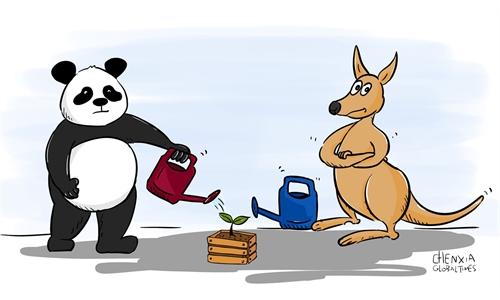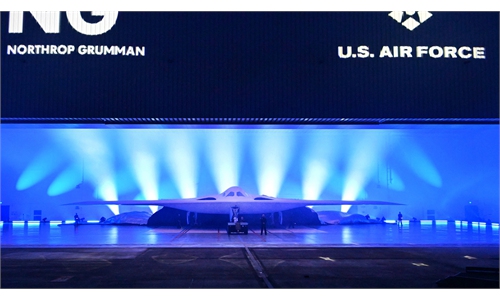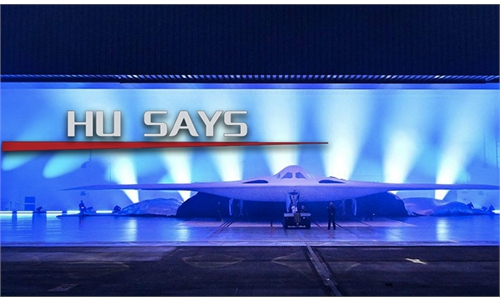US’ latest arms sale proposal to Taiwan island may hinder China-US military exchanges; little help for secessionists to gain a military edge
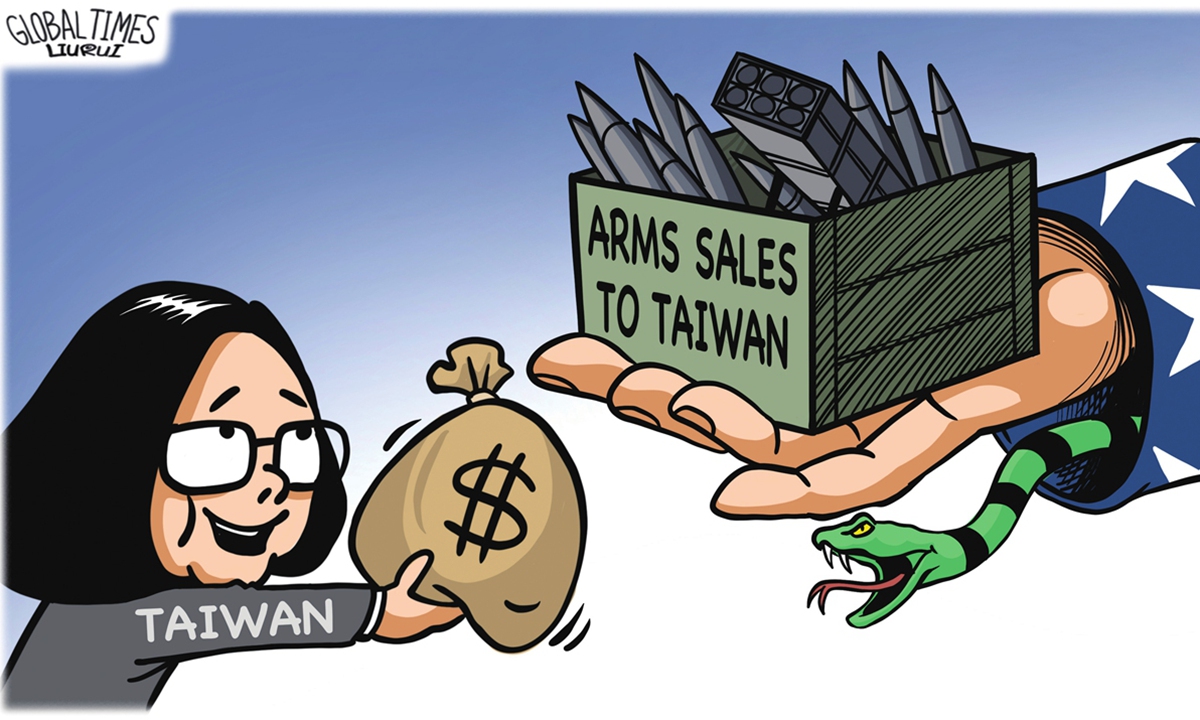
Illustration: Liu Rui/GT
The provocative arms sale to China's Taiwan region will make it more difficult to restore China-US military cooperation and exchanges, Chinese experts warned Tuesday, following reports that Washington has proposed arms sale to the secessionist Taiwan authorities, less than a month after two heads of state met face-to face in Bali, when US President Joe Biden reaffirmed that the US does not support "Taiwan independence," and has no intention to engage in conflict with China.
Given the absolute military advantage of the Chinese mainland over Taiwan island, the US arms sales to Taiwan would be more about political provocation than a military support in practice, experts said. They also urged the US to be true to its words and deeds, take concrete actions to stop provocations against China's core interests on the Taiwan question and refrain from sending wrong signals to Taiwan secessionists after their fiasco in the recent local elections.
According to a US State Department notice obtained by Bloomberg, the Biden administration has proposed selling Taiwan as many as 100 of its most advanced Patriot air-defense missiles, as well as radar and support equipment in a deal valued $882 million.
The proposal, according to Bloomberg, was made under the provisions of an Obama administration 2010 $2.81 billion arms sale to the island of Taiwan and therefore "technically is not new." The US media mentioned that the 2010 package "infuriated Beijing" at the time and led it to halt military exchanges.
The notice to US lawmakers is expected to be printed in the Congressional Record as soon as Tuesday and will be reviewed by Congress for up to 30 days, according to Bloomberg.
The latest US military sales to Taiwan under the Biden administration was approved by the US State Department on September 2, a potential $1.1 billion package including $355 million for Harpoon air-to-sea missiles and $85 million for Sidewinder air-to-air missiles, according to US media reports. The package was approved after the outgoing US House Speaker Nancy Pelosi's reckless visit to Taiwan island where she met with secessionists in August.
China announced eight countermeasures in response to Pelosi's highly provocative tour, including halting China-US theater commanders talk, defense policy coordination talks, military maritime security consultative mechanism and suspending cooperation on illegal immigration repatriation, drug control and climate change.
Li Haidong, a professor from the Institute of International Relations at the China Foreign Affairs University in Beijing, told the Global Times on Tuesday that the US says it supports the one-China policy, but its action is to pull Taiwan away from China.
US arms sale would be easily interpreted by the Democratic Progressive Party (DPP) as a signal of support from the US for "seeking independence" and a blow to Taiwan compatriots' efforts to strengthen ties with the mainland, especially after the secessionists DPP's fiasco in the local elections, Li said.
The US arms sale to Taiwan tramples on one of the cornerstones of the stability of the China-US relations and current international relations, namely the one-China principle, Li said.
Xin Qiang, deputy director of the Center for American Studies at Fudan University, told the Global Times on Tuesday that arms sales to Taiwan could hinder the resumption of the halted military and other exchanges between China and the US.
In November, some analysts were optimistic that China and US could resume exchanges in the military and other aspects that were halted due to Pelosi's irresponsible moves after the first face-to-face meeting between the leaders of the world's two biggest economies since Biden took office at the G20 Summit in November. During the meeting, Chinese President Xi Jinping stressed that the Taiwan question is at the very core of China's core interests, the bedrock of the political foundation of China-US relations, and the first red line that must not be crossed in China-US relations. Biden said at the meeting that the US does not support "Taiwan independence," does not support "two Chinas" or "one China, one Taiwan."
The US should take more substantive measures to stop provocations on the Taiwan question and convince China that it is sincere in improving China-US relations, rather than saying one thing and doing another, Xin said. "Disclosing the arms sale at this point seems like saying that it will not give up playing the 'Taiwan card' to contain China and hinder China's reunification."
It cannot be ruled out that there are some extreme ideological conservative anti-China forces in the US, who are trying to block the momentum of the recent sound development of China-US relations, including the consensus reached between the two leaders in the G20, Li said.
But no matter what happens inside the US, arms sales to Taiwan mean damage to China's core interests and interference in China's internal affairs, and China needs to give the US a serious warning over it, Li added. "If arms sales do happen, China will not do nothing."
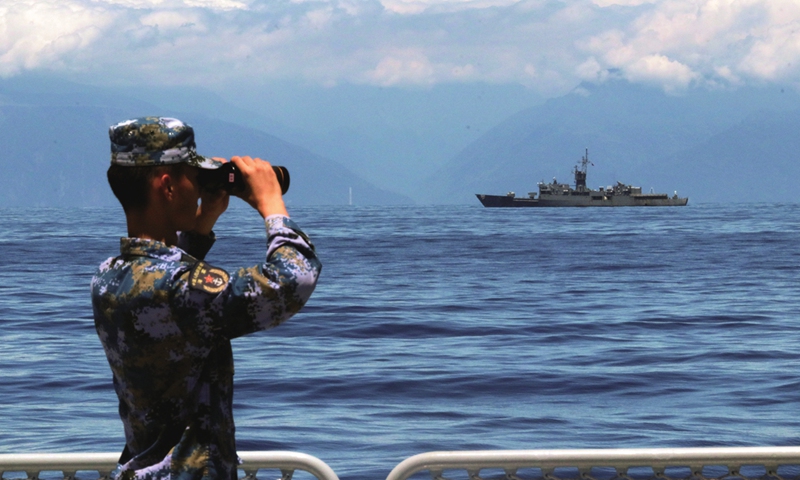
A PLA soldier looks around with a telescope on August 5, 2022, as the Navy of the PLA Eastern Theater Command continues drills the waters around the island of Taiwan. Photo: Xinhua
Little military significance
The US' arm sales to Taiwan in recent years have become increasingly aggressive with more powerful equipment. However, the 100 Patriot air defense missiles will not help the island of Taiwan gain a military edge over the Chinese mainland, as the People's Liberation Army (PLA) can launch saturation attacks including those with hypersonic missiles and stealth aircraft that would completely overwhelm the island's air defense, said Chinese mainland analysts.
According to Bloomberg, some 100 missiles of the hit-to-kill PAC-3 Missile Segment Enhancement are planned to be delivered to the island of Taiwan. This version of the Patriot missile allegedly has increased range and covers higher altitude against tactical ballistic missiles, cruise missiles and warplanes thanks to the use of a dual pulse rocket engine and modified aerodynamic design, a Chinese mainland military expert told the Global Times on Tuesday, requesting anonymity.
But it will have no chance against the PLA's hypersonic missiles which no current air defense system is capable of intercepting; stealth-capable cruise missiles and warplanes can also destroy the installations undetected, creating openings for additional attacks, the expert said.
The PLA Rocket Force operates the DF-17 short-to-medium range hypersonic missile, and the PLA Air Force just displayed a type of air-launched ballistic missile also believed to be hypersonic at Airshow China 2022, carried by the H-6K bomber.
Aircraft like the J-20 fighter jet and the GJ-11 drone are stealth-capable, and a type of stealth cruise missile was carried by the J-16 fighter jet and the JH-7A fighter bomber displayed at Airshow China.
The PLA can also simply pour a large number of munitions into saturation attacks, including inexpensive long-range rockets, which will outnumber the island of Taiwan's air defense missiles, the expert said.
No matter what weapons the US sells to the island of Taiwan, there will be no change to the PLA's overwhelming advantage in the Taiwan Straits, analysts said.
